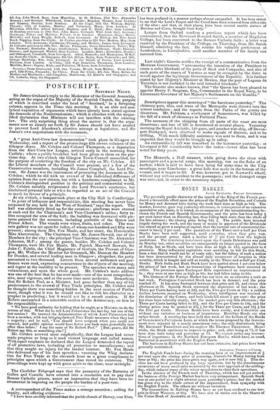A " great Anti-Corn-law demonstration" took place in Glasgow on
Wednesday, and a report of the proceedings fills eleven columns of the Glasgow Argus. Mr. Cobden and Colonel Thompson, as a deputation from the Anti-Corn-law League, arrived early in the morning from Carlisle; where a public breakfast had been given to them on the pre- vious day. At two o'clock the Glasgow Town-Council assembled, for the purpose of conferring the freedom of the city on Mr. Cobden. All the Liberal members of the Council were present, and a few of the Conservative members, including Sir James Campbell, the Lord Pro- vost. Sir James was the instrument of presenting the document to Mr. Cobden ; which he did with an avowal of his individual difference of opinion from the new citizen, but with a handsome compliment to Mr. Cobden's distinguished position in the political and commercial world. Mr. Cobden suitably reciprocated the Lord Provost's courtesies, but disclaimed personal title to what he regarded as an act of the Council to mark its favour of a principle. At six o'clock, a banquet took place at the City Hall in Candleriggs. " In point of influence and respectability, this meeting has never been surpassed by any held in the West of Scotland," says the report. The ball was elaborately fitted up for the occasion : platforms were erected at each end for the Chairman's and Vice-Chairmen's tables ; forty ta- bles occupied the area of the hall; the building was decorated with pic- tures painted for the occasion, including portraits of the Queen and Prince Albert. The viands were wines, fruits, and cakes. The wes- tern gallery was set apart for ladies, of whom one hundred and fifty were present ; among them Mrs. Fox Maule, and her sister, the Honourable Miss Abercromby. The Chairman was Mr. James dswald, one of the Members for the city ; the principal Vice-Chairman was Mr. Alexander Johnston, M.P.; among the guests, besides Mr. Cobden and Colonel Thompson, were Mr. Fox Maule, Mr. Patrick Maxwell Stewart, Sir John C. Fairlie, the Chief Magistrate of Gorbals, the Provost of Glas- gow, Mr. Wallace the Member for Greenock, Mr. Duncan the Member for Dundee, and several leading men in Glasgow ; altogether, the party amounted to two thousand. Letters from several noblemen and gen- tlemen were read, expressing concurrence in the objects of the meeting, and regret at the inability to be present. The speeches were many and voluminous, and upon the whole good. Mr. Cobden's main address was one of the best that he has ever made—one of the most comprehen- sive, most vigorous, and at the same time most moderate. Remarking that Sir Robert Peel, as a Minister, had gone further than any of his predecessors in the avowal of Free Trade principles, Mr. Cobden said he thought there was something hidden in the next session of Parlia- ment, though what it was he should not like to risk his character as a prophet in predicting ; but it would not be a smooth session. If Sir Robert succumbed to a miserable section of the Aristocracy, on him be the responsibility- " We have good authority for holding that he ought, as a Minister, to do the reverse of this. What did he tell Lord Palmerston the last day but one of the last session ? He taunted the Administration of which Lord Palmerston had been a member, with not bringing forward Free Trade measures when they had a majority; and he said, You should have resigned when you could not succeed, and public opinion would have borne you back more powerfully into office than before.' I say the same of Sir Robert Peel." [But, Tarr; did Sir Robert say this, or something else?) Mr. Cobden avowed most emphatically, that the League had never made progress so long as it used violent language and called names. With equal emphasis he declared that the League demanded the repeal of all protective laws, including all protection to manufactures ; and that they sought no injury for the landed interest. Mr. Fox Hanle also delivered one of his best speeches ; vaunting the Whig declara- tion for Free Trade at the eleventh hour as a great compliment to principles upon which a Government thus rested its existence. The proceedings were kept up with great spirit to the close, near midnight.


























 Previous page
Previous page